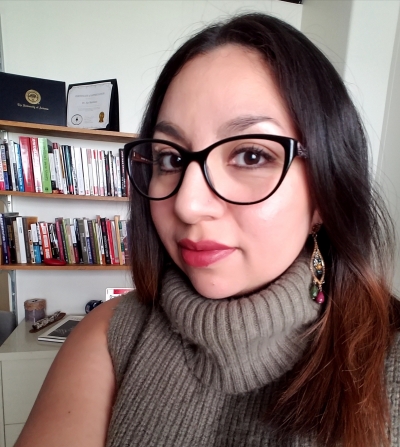URI welcomed Aja Martinez of The University North Texas, to talk about Critical Race Theory. PHOTO CREDIT: English.unt.edu
Critical Race Theory (CRT) scholar Aja Martinez spoke to faculty from the University of Rhode Island last week about what CRT is, how it is used in academia and how to implement it in the classroom.
Martinez, an assistant professor of English at the University of North Texas, was invited by the URI writing and rhetoric department to speak to faculty from the Harrington School and the English department about her research on using counter-storytelling as a method to enact CRT in writing.
Martinez is well known in academia for her book “Counterstory: The Rhetoric and Writing of Critical Race Theory.” The book focuses on how stories outside of the mainstream or from other(ed) people and groups can be used in education to challenge the “majority views” in academia.
The event began with Martinez talking about how gatekeeping minimizes or completely removes minority voices within academia. In the past, the study of rhetorics completely focused on learning the Euro-centric study of rhetoric dominated by the perspective of white men. Since then, there has been more emphasis on adding other voices into rhetoric, but according to Martinez, there are still many stories from marginalized groups that are being left out of academia.
“I believe that we’ve been telling stories all along, but some stories are elevated to the status of theory, scholarship and literature, while too often minoritized perspectives are relegated to marginalized and overlooked cultural rhetorics, methods or genres,” Martinez said. “I don’t know when, or if, these academic gatekeepers will arrive at a point of admission that all work, especially in the humanities, is story.”
Later in the talk, she noted that even when minority voices are allowed into an academic setting, they are often not part of required courses or are a footnote in the “master’s narrative.” Because of this, students’ engagement with minority viewpoints and experiences are often diminished within academia.
As a scholar of CRT, Martinez has experienced a lot of backlash in the past year from people who do not understand what CRT is. She noted that her field has been vilified both nationally and in her own home state of Texas, where Governor Greg Abbott banned the teaching of CRT in classrooms.
“My engagement in the CRT field builds particularly on the powerful work of critical race theorists who define critical race methodology as a challenge of the majoritarian stories or ‘master narratives of white privilege,’” Martinez said. “This methodology rejects the notion of neutral research that silences and distorts epistemologies of people of color. Critical Race methodology recognizes that the experiential knowledge of people of color is legitimate and critical to understanding racism that is often well disguised in the rhetoric of normalized structural values and practices.”
Lehua Ledbetter, an associate professor in the writing and rhetoric department, was one of the professors who attended the event. She works in cultural rhetorics, a similar field of study to Martinez, and was familiar with her. Ledbetter works to legitimize non-academic communities within academia, similar to Martinez’s point about gatekeeping in academia.
One of the most important pieces of information that Ledbetter got from the event was when Martinez brought up the importance of any work being useful not only within academic circles but also in the real world.
“[Martinez] is saying our work is not useful unless it also is useful outside of academia,” Ledbetter said. “So we need to do both. We can’t just create knowledge for and within, because it’s not helpful. It’s not helpful to the actual change-making we want to do, and it’s not really [making change] if it is only relevant to one percent of people.”
After this event, Ledbetter got a copy of Martinez’s book and plans on integrating parts of it into her classes this semester. She noted that events like this are important for faculty and students alike, even if attendees only gain “one nugget of information.”
At the end of her presentation, Martinez took questions from the attendees. One professor asked for advice on how to avoid speaking over others as a white person in academia. Martinez said that the best way to do so is to collaborate with people of color and minorities rather than speaking for or over them. She also noted that it takes self-work to do so as well.
“I think Frankie Condon has some of the best advice for that,” Martinez said. “So start with yourself in that critical self-reflection and introspection, to dredge up and dredge out whatever it is that needs to be addressed about these racial issues. What is it about your whiteness that you should be interrogating and starting with? And that is what the counter-story is for.”

